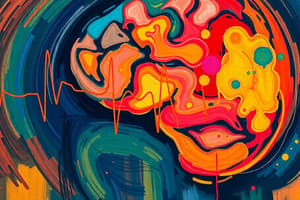Podcast
Questions and Answers
What are some examples of sleep disorders?
What are some examples of sleep disorders?
- Narcolepsy and REM Behaviour Disorder (correct)
- Frequent headaches and migraines
- Depression and anxiety
- Insomnia and restless leg syndrome
What is narcolepsy characterized by?
What is narcolepsy characterized by?
- Insomnia and difficulty falling asleep
- Sleepwalking and night terrors
- Excessive snoring and breathing interruptions during sleep
- Frequent periods of sleepiness during the day and a lack of hypothalamic cells that produce and release orexin (correct)
Which sleep disorder involves moving around vigorously during REM sleep?
Which sleep disorder involves moving around vigorously during REM sleep?
- Violence during sleep
- Narcolepsy
- Sleepwalking
- REM Behaviour Disorder (correct)
What may cause sleepwalking?
What may cause sleepwalking?
What are some consequences of sleep deprivation on the brain and cognition?
What are some consequences of sleep deprivation on the brain and cognition?
What can chronic sleep deprivation lead to?
What can chronic sleep deprivation lead to?
What is violence during sleep associated with?
What is violence during sleep associated with?
Flashcards are hidden until you start studying
Study Notes
- Sleep disorders include narcolepsy, REM Behaviour Disorder, sleepwalking, and violence during sleep.
- Narcolepsy is characterized by frequent periods of sleepiness during the day and a lack of hypothalamic cells that produce and release orexin.
- REM Behaviour Disorder involves moving around vigorously during REM sleep and is associated with deficient GABA.
- Sleepwalking involves complex movements during NREM sleep and may be caused by sleep deprivation, stress, or alcohol.
- Sleep deprivation has widespread consequences on the brain and cognition, including reduced functional connectivity of the amygdala and executive control regions, explicit learning and memory problems, and inhibition of neurogenesis and long-term potentiation.
- Chronic sleep deprivation can lead to a shrinkage of the hippocampus.
- SD is associated with lower academic performance in students.
- Violence during sleep is associated with several sleep disorders, including RBD and NREM parasomnia.
- Congenitally blind people and cats with lesions to the visual cortex still exhibit REM sleep.
- Stimulation of the brainstem can induce seemingly complex behaviors of an evolutionary nature.
Studying That Suits You
Use AI to generate personalized quizzes and flashcards to suit your learning preferences.




